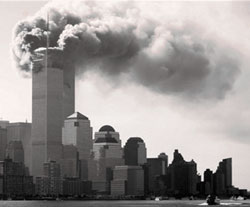
UNITED NATIONS (FinalCall.com) – It was on November 10, 2001 that President George W. Bush used the United Nations General Assembly as a bully pulpit to exclaim to the world, “either you are with us or against us in our global fight against terrorism.” The Security Council had already taken a stand against terrorism on September 12, 2001 with a declaration condemning such acts as crimes against humanity.
The post 9-11 outpouring of global sympathy was unanimous. Condolences came from world leaders such as Cuba’s President Fidel Castro and Libya’s Muammar Gadhafi. The tiny Kenyan village of Enoosaeen presented the people of the United States with a herd of 14 cows to ease the suffering of losing over 3,000 lives in the terrorist attacks.
But the question a few days before Americans pause to remember the second anniversary of the attacks is, how does the world view America now? And how will the nations of the world greet Mr. Bush when he addresses them on September 23rd?
“On September 11, 2001, Russians were compassionate because of CNN’s broadcasting the images of Americans who had been terrified by the attacks on the World Trade Center and the Pentagon,” Vladimir Kikilo, UN Bureau Chief for the Russian News Agency told The Final Call. He said today, many Russians view 9-11 as a “vindication” for the U.S. bombing of Yugoslavia in 1999. “The situation in Iraq has also aggravated U.S./Russian relations,” Mr. Kikilo said, adding, “Russians resent the U.S. contention that it can go it alone, when it comes to world events.” He also said that Russians realize that America and the West are not sincere in their relations with Russia.
A Mexican journalist, speaking on the condition of anonymity, said that the Mexican people two years later feel antipathy towards the U.S. “because of Afghanistan and Iraq.”
“Mexicans are disgusted with Bush’s unilateral attitude,” the journalist said.
In a survey called “Transatlantic Trends 2003” conducted in June 2003, Europeans questioned U.S. global leadership. The poll showed that European majorities expressed disapproval of most U.S. foreign policy. In France, 70 percent; Germany, 50 percent; and Italy, 50 percent believe global U.S. leadership is “undesirable.” The U.S.-based German Marshall Fund conducted the survey, along with the Compagnia di San Paolo based in Turin, Italy.
Former National Security Adviser to President Bill Clinton from 1997 to 2000, Samuel R. Berger, said in 2002 that leaders in Germany and South Korea–two of our closest allies–were elected partly because of anti-American sentiment. “We could not persuade even long-time friends such as Chile and Mexico to support us in the UN on Iraq,” Mr. Berger said.
Referring to the Marshall Fund poll, Mr. Berger said: “A major global survey found that favorable opinions of the U.S. have fallen in nearly every country over the past two years, and have plummeted to a new low in most of the Muslim world from the Middle East to Indonesia and Nigeria. Our actions are contributing to that sentiment.”
The opinion of people outside of the United States is definitely on the American media radar screen. On September 11, a documentary will air, called “Searching for the Roots of 9-11, why U.S.?” According to press releases, “viewers will get a portrait of the roots of Muslim rage and resentment towards America from places such as Indonesia, Qatar, Egypt and Europe.”
Joseph Ciriname, author of “Deadly Arsenals: Tracking Weapons of Mass destruction,” and director of the Non-Proliferation Project at the Washington-based Carnegie Endowment for International Peace, said he believes that the Bush doctrine seems likely to generate exactly the anti-U.S. coalitions that it was designed to discourage.
“Of the 200 countries in the world, the U.S. claims that 40 of those governments supported the war in Iraq. And the people of almost all of those nations actually opposed the attack in overwhelming majorities,” Mr. Ciriname said.
But analysts such as Rami G. Khorui, executive editor of The Daily Star, which is published in Beirut, Lebanon, and other Arab cities, says there is light at the end of the tunnel for Mr. Bush in the Arab world.
“The biggest complaint against the United States is that it practices a double standard, promoting liberty, equality and justice at home, but supporting autocracy, oligarchy, occupation and oppression in the Arab world,” Mr. Khorui stressed. He said the U.S. government should implement a foreign policy based on a common standard of human rights for all people. “If it did that, the U.S. would have more friends than it could count,” he added.
But David Limbaugh, an occasional columnist for the Washington Times and the brother of national syndicated radio-talk show host Rush Limbaugh, says that American national interests will continue to guide President Bush’s foreign policy. “I don’t believe he (Pres. Bush) is hell-bent on forcibly exporting democracy, much less establishing and expanding an American empire. Nor do I believe he wants America to become the world’s policeman,” Mr. Limbaugh said.
He said Mr. Bush would take unilateral military action if necessary to prevent another September 11, 2001. “Sometimes this may entail bombing terrorist targets in other countries. In more extreme cases, it may require dismantling the terrorist-sponsoring regime itself,” Mr. Limbaugh said.












